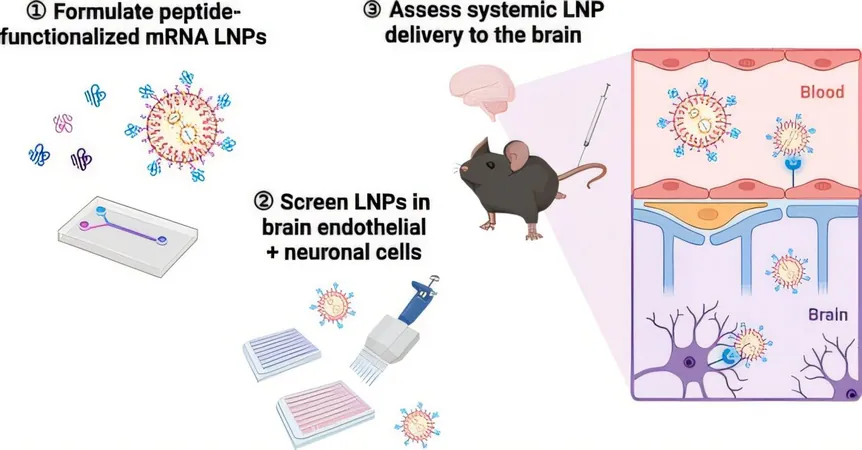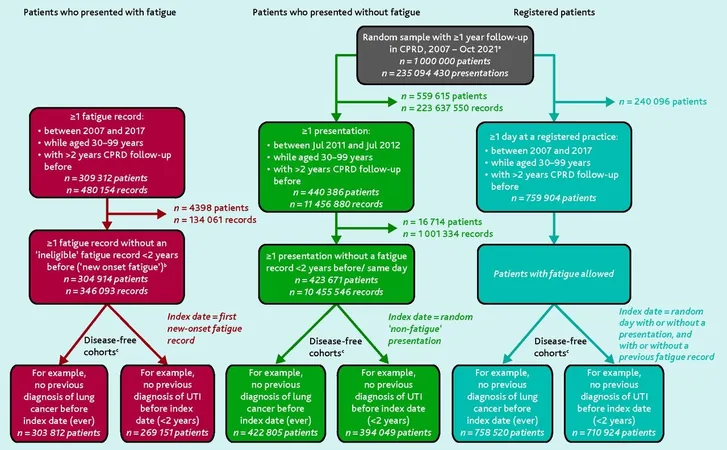
Unlocking the Brain: Revolutionary Nanoparticles Deliver mRNA to Neurons!
2024-12-17
Author: Emily
Revolutionary Nanoparticles for mRNA Delivery
In a groundbreaking study published in *Nano Letters*, researchers from the University of Pennsylvania have achieved a remarkable feat: modifying lipid nanoparticles (LNPs)—the same technology that powered COVID-19 mRNA vaccines—to cross the blood-brain barrier (BBB) and accurately deliver mRNA to specific cells, including crucial neurons. This pioneering advancement opens new avenues for treating devastating neurological diseases like Alzheimer's and Parkinson's, which affect millions worldwide.
For years, the challenge of effectively delivering therapies to the brain has been daunting due to the protective nature of the BBB, which acts as a fortress against harmful substances, including many essential medications. Historically, most pharmaceutical approaches have proven inadequate, as traditional mRNA molecules are often too large to traverse this barrier.
Innovative Use of Peptides
However, the Penn team has synthesized a solution through the innovative use of peptides—short chains of amino acids that serve as precise targeting molecules. This enables the LNPs to deliver mRNA not just broadly but with the precision necessary to reach the endothelial cells whose health is critical for brain function.
"It's like sending a package to a general area without knowing where it will land. Now, with this peptide technology, we can ensure it reaches the exact destination," explained Michael J. Mitchell, Associate Professor of Bioengineering and the paper's lead author.
The Mystery of the Blood-Brain Barrier
Previously, penetrating the BBB typically required invasive procedures like direct injections into the brain. While these methods exist, they pose significant risks and complications. The innovative peptide-LNP approach bypasses these challenges, leveraging the natural ability of certain lipid-based compounds to permeate the barrier like alcohol or THC.
In a twist of fate, the inspiration for using peptides arose from a personal encounter with a bat, which spurred graduate student Emily Han to investigate how rabies virus components traverse the BBB. This unexpected moment led to the identification of RVG29, a promising peptide that could enhance the mRNA delivery system.
Comparison of Peptides and Antibodies
Traditionally, researchers have relied on antibodies to direct nanoparticle delivery, but these large proteins can complicate the nanoparticle structure, making it difficult for them to pass through the BBB. Peptides, being significantly smaller and cheaper to produce, represent a breakthrough alternative that can maintain stability and reduce the risk of unintended immune responses during treatment.
Testing and Validation
The researchers endured extensive testing to confirm the effectiveness of their method. They initially validated that the peptides could adhere to the LNPs. Following this, they meticulously mapped out the delivery success within animal models—a process compared to disassembling an engine due to the brain's complex environment filled with various cell types and fats that could obscure results.
What’s Next?
Looking forward, the team is now focused on understanding what percentage of neurons need to be treated to achieve significant therapeutic benefits for conditions like Alzheimer’s and Parkinson’s. As Mitchell noted, “It’s crucial to determine if we need to target every single neuron or if treating 10% will suffice for a meaningful impact.”
This pioneering research brings us closer to a future where mRNA-targeting therapies are routinely used to treat some of the most challenging diseases, potentially changing countless lives.
Keep your eyes peeled for updates on this revolutionary approach to brain health, as it may herald a new era of targeted, effective treatments for neurodegenerative diseases!









 Brasil (PT)
Brasil (PT)
 Canada (EN)
Canada (EN)
 Chile (ES)
Chile (ES)
 España (ES)
España (ES)
 France (FR)
France (FR)
 Hong Kong (EN)
Hong Kong (EN)
 Italia (IT)
Italia (IT)
 日本 (JA)
日本 (JA)
 Magyarország (HU)
Magyarország (HU)
 Norge (NO)
Norge (NO)
 Polska (PL)
Polska (PL)
 Schweiz (DE)
Schweiz (DE)
 Singapore (EN)
Singapore (EN)
 Sverige (SV)
Sverige (SV)
 Suomi (FI)
Suomi (FI)
 Türkiye (TR)
Türkiye (TR)